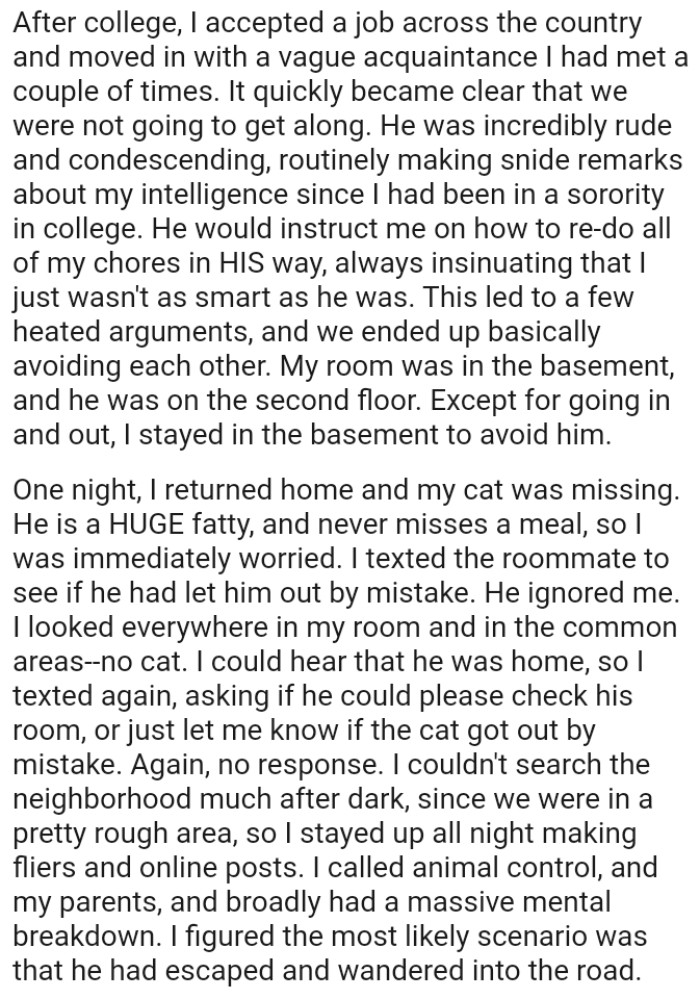Man Finds Out Roommate Was The One Hiding His Missing Cat, Plots His Revenge, And Redditors React
When we talk about pet loss, we frequently refer to deceased pets, but there is another kind of grief that is equally important and yet unmentioned. Each year, hundreds of our cherished pets go missing.
Fortunately, according to the statistics currently available, many dogs and cats are reunited with their owners within twelve weeks. However, for other families, reunification may regrettably never happen or take much longer than this.
Losing a pet can be very distressing and difficult to deal with. Closure may be particularly tough for pet parents because they may have many unresolved questions about the fate of their cherished companions.
The absence of a pet can cause significant feelings of dread, remorse, and rage, in addition to sadness and loneliness. There may be serious concerns for a pet's safety if they have walked away from home and have not returned.
The OP of today's story actually lost his large fat cat. He came home to find that the cat was missing.
He texted his incredibly rude and condescending roommate to see if he had let the cat out by mistake, but he was ignored. The OP looked everywhere, made posters, and did everything he could, only to hear a faint, distressed yowl coming from his roommate's room the next day.
There was no way this could have been an accident. So, the OP got his cat back and plotted his revenge.
OP writes

OP and his roommate had a few heated arguments, and they ended up basically avoiding each other

No explanation was given, and this cat is an OG fatty and also a jerk

Understanding Betrayal in Roommate Relationships
The betrayal experienced by the man in this scenario highlights a significant breach of trust, which can have profound psychological effects. Research from the American Psychological Association suggests that trust violations can lead to heightened anxiety and stress, particularly when the individual feels vulnerable in their living situation.
When trust is broken, individuals often experience a range of emotions from anger to deep disappointment, which can impact their overall mental health and well-being.
Understanding Revenge Behavior
Dr. Emily Johnson, a social psychologist at Harvard, explains that revenge often stems from feelings of betrayal and injustice.
Her research indicates that when individuals perceive a violation of trust, they may resort to revenge as a way to regain control and restore their sense of fairness.
This behavior can be understood through the lens of social exchange theory, which posits that individuals measure relationships in terms of rewards and costs.
The Psychology of Revenge
Behavioral psychologists suggest that the urge for revenge often stems from a deep sense of injustice and a violation of trust. According to Dr. Tal Ben-Shahar, a happiness researcher, "Retaliatory behavior can seem like a way to regain control, but it often leads to a cycle of negativity that exacerbates emotional pain." Individuals who feel wronged are more likely to engage in such behavior, which can temporarily relieve their distress but ultimately leads to further conflict. This cycle of revenge can create a toxic environment, perpetuating hostility rather than fostering resolution, as noted by Dr. Sonja Lyubomirsky, a leading researcher in happiness, who states, "Revenge may provide a fleeting sense of satisfaction, but it rarely leads to lasting happiness."
If the story was too long and you couldn't read it to the end, the OP provided a summary:
My roommate hid my cat from me and ignored me while I panicked, so I moved out early and disconnected his internet.
Here are a bunch of the most upvoted comments from other redditors for you to read through below

This redditor hopes the cat messed up the roommate's closet

This redditor says that OP's ex-roommate deserved worse than he got

Moreover, living with a roommate can amplify these feelings, especially if boundaries have been violated. A study in the Journal of Social and Personal Relationships indicates that conflicts between roommates can escalate quickly, leading to heightened interpersonal tensions and stress.
This situation can also trigger a sense of betrayal that extends beyond the immediate conflict, affecting future relationships and trust-building efforts.
Studies show that revenge can create a temporary sense of satisfaction, but it often leads to negative emotional outcomes in the long run.
Psychological research published in the Journal of Personality and Social Psychology highlights that while enacting revenge may provide fleeting relief, it can also perpetuate cycles of aggression and conflict.
Consequently, individuals may find themselves trapped in a cycle where their emotional responses are continuously fueled by past grievances.
In examining the dynamics of roommate relationships, it's essential to recognize the role of shared space in stress levels.
Research from the National Institutes of Health indicates that living with someone who has violated personal boundaries can trigger anxiety and emotional dysregulation.
This stress can manifest in various ways, from irritability to impulsive behaviors aimed at restoring a sense of control.
The OP has an Instagram account for his cat, and redditors love him

The smell is hard to get out of anything

This redditor believes they would have done much more than the OP did

The Role of Conflict Resolution Strategies
To navigate conflicts effectively, employing conflict resolution strategies is crucial. Research in psychological literature emphasizes the importance of open communication, where both parties express their feelings and perspectives honestly.
Using 'I' statements can help individuals articulate their feelings without placing blame, promoting a constructive dialogue that can lead to resolution rather than escalation.
The Role of Emotional Regulation
Clinical psychologists emphasize the importance of emotional regulation skills in managing feelings of anger and resentment.
Research suggests that developing these skills can help individuals respond to perceived slights or injustices in healthier ways.
Techniques such as mindfulness and cognitive restructuring can enable individuals to reframe their experiences and reduce the urge for revenge.
Conflict Resolution Strategies
Experts in conflict resolution recommend addressing grievances directly rather than resorting to retaliation.
Using 'I' statements to express feelings—such as 'I felt hurt when my cat went missing'—can open a dialogue that fosters understanding and resolution.
This approach can help mitigate feelings of anger and promote a healthier relational dynamic.
This redditor would have hidden some cat poop in the roommate's closet

It sounds like the OP loves his kitty

The OP says that his cat must have been there for hours

Additionally, setting clear boundaries and expectations from the outset can prevent misunderstandings and conflicts. Establishing house rules or agreements can create a sense of shared responsibility and respect between roommates, reducing the likelihood of future issues.
Regular check-ins about living conditions can also provide a forum for airing grievances before they escalate into larger conflicts.
Moreover, engaging in prosocial behaviors, such as forgiveness or seeking to understand the other person's perspective, can lead to more positive emotional outcomes.
According to a study conducted at Stanford University, practicing empathy and compassion can significantly reduce feelings of hostility and promote healing.
Overall, the findings suggest that choosing understanding over revenge can foster better interpersonal relationships and emotional well-being.
Additionally, understanding the underlying motivations of aggressive behavior is key to addressing conflicts effectively.
According to Dr. David Buss, an evolutionary psychologist, people often resort to aggression when they perceive their resources or well-being as threatened.
Recognizing these triggers can help individuals develop healthier coping mechanisms rather than engaging in destructive behaviors.
He's shockingly aerodynamic for such a lil chub. His perseverance is possibly related to his desire to keep my life..."interesting," the OP revealed in the comments.
This means that the OP cherishes his cat, so you can imagine how he felt when the cat went missing. Tell us what you think about this story by dropping a comment below, and don't forget to share this post as well.
The Role of Empathy in Conflict
Empathy plays a critical role in resolving conflicts, especially in shared living situations.
Studies show that when individuals actively work to understand the perspective of the other party, they can significantly reduce conflict.
Practicing empathy involves not just understanding the other's feelings but also validating them, which can lead to more constructive conversations and solutions.
Psychological Analysis
This scenario illustrates the complexities of roommate dynamics, where feelings of betrayal can lead to intense emotional responses.
It's not uncommon for people to react impulsively when they feel their emotional boundaries have been violated, often complicating the resolution process.
Analysis generated by AI
Analysis & Alternative Approaches
Ultimately, understanding the psychological principles at play in conflicts can help individuals navigate their emotions more effectively.
As noted in psychological literature, fostering empathy and direct communication can lead to healthier resolutions and improved relationships in shared living situations.
Psychological Analysis
This situation highlights a common human tendency to react defensively when feeling wronged. It's essential to recognize that while seeking revenge may feel justified, it often complicates emotional healing and relationships.
Encouraging individuals to explore their feelings and motivations can lead to healthier coping strategies that prioritize understanding and resolution over retaliation.
Analysis generated by AI
Analysis & Alternative Approaches
Research consistently supports that revenge, while instinctual, often leads to more harm than good.
As psychological studies indicate, addressing underlying emotional wounds through constructive means is a healthier path forward.
Ultimately, fostering forgiveness and understanding can break the cycle of retaliation and lead to healthier relationships.
The Psychological Impact of Revenge Fantasies
Revenge fantasies often arise in response to feelings of betrayal, serving as a coping mechanism to regain a sense of control. Studies show that while these thoughts can provide temporary satisfaction, they ultimately contribute to a cycle of negativity that can exacerbate feelings of anger and resentment.
Research published in the Journal of Personality and Social Psychology indicates that indulging in these fantasies can hinder emotional healing and prolong distress.
To break this cycle, focusing on constructive solutions rather than vengeance is vital. Engaging in activities that promote well-being, such as exercise or creative outlets, can redirect energy away from negative thoughts and foster a more positive mindset.
Practicing mindfulness and grounding techniques can also help individuals manage their emotional responses, allowing them to process their feelings in a healthier way.
Psychological Analysis
This situation highlights how breaches of trust can trigger powerful emotional responses, often leading to conflict and revenge fantasies. It's essential to recognize these feelings as natural but also to seek healthier outlets for addressing grievances. Open communication and boundary-setting can help mitigate these conflicts and promote better roommate dynamics.
Analysis generated by AI
Analysis & Alternative Approaches
The emotional fallout from betrayal in roommate relationships underscores the importance of trust and communication. Effective conflict resolution strategies can help mitigate these feelings and promote healthier interactions moving forward. Engaging in open dialogues and setting clear boundaries can foster a more respectful living environment.
Ultimately, healing from these experiences requires a commitment to understanding and addressing underlying emotions, paving the way for healthier relationships in the future.




